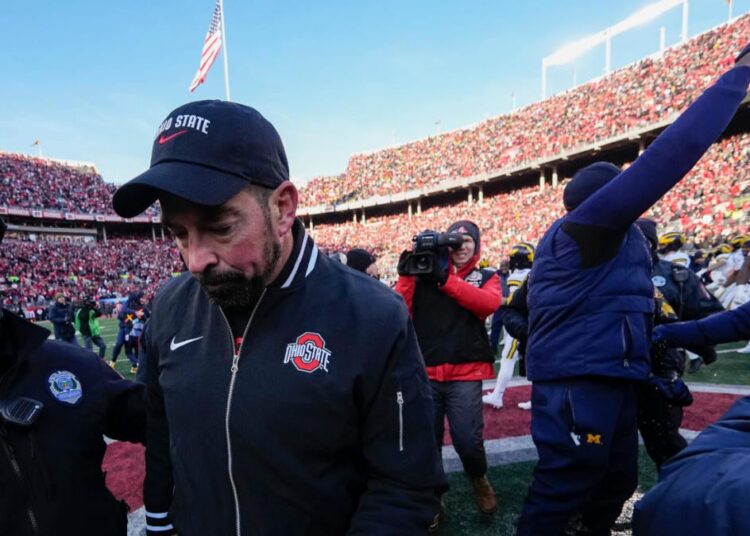Ryan Day navigated the wildest month in Ohio State history with aplomb.
He was rewarded this week with the second-richest contract in college football: a $12.5 million salary for the next seven years. That’s what happens when you win a national title at one of the blueblood schools. Now one of only three active coaches with a national title, financial security — and his place in Ohio State history — will never be a question.
Still, is it worth it? How quickly we forget the insane emotional toll a small faction of extreme fans placed on him and his family just two months ago after the Buckeyes lost to rival Michigan for a fourth straight year. Some saw it firsthand. His family cried on the sideline near the end of that 13-10 loss. In the subsequent days, there were death threats, and Day hired security to watch his home and protect the family around the clock so he could go back to work.
In a cynical world where fans and media levy harsh, and sometimes personal, criticism and give zero grace to head coaches — “That’s what the money is for!” they say — we forget that we are fragile flesh and bone. Multi-million dollar security blankets are offered to coaches to cope, but it doesn’t provide an impenetrable barrier from real-world issues.
Day, a mental health advocate, speaks often about leading men, perseverance and blocking out the noise and the threats. Still, the negativity creeps in the shadows, waiting to re-emerge. Somehow a coach with a 70-10 record, the best winning percentage among all active coaches, is not immune.
When Day ripped off his headset and rifled it into the air near the end of a 34-23 win in the national championship game against Notre Dame, you got the sense the display was one of relief rather than celebration. That much was confirmed the next morning, when Day was asked if there would be less pressure on Ohio State in 2025 now that the Buckeyes have their first national title in 10 years.
“Try losing the first game and see how that goes at Ohio State,” Day said. “We’ll see about that.”
He’s right. As beautiful as that pen-shaped championship trophy looks in the display case, it’s not a pressure valve.
Ohio State rode a ‘Last Dance’ approach to 2024 championship. Does that mean trouble is on the way in 2025?
John Talty
What happens if Ohio State loses its 2025 season opener against Texas, another title contender?
Heck, what if Michigan beats the Buckeyes for a fifth straight year for the first time since the 1920s?
Pitchforks will be raised, but that shouldn’t be the concern. Will the “lunatic fringe,” as ESPN analyst and Ohio State alum Kirk Herbstreit terms it, remain quiet? Habits are hard to break.
The hope here is fans and media realize regular-season expectations should change. A team no longer needs to win a conference title and/or beat their rival to become a threat in the playoff. The 12-team field has allowed more room for error, no matter how large it may seem to some fans. No conference champion reached the semifinals last season.
Simply put, in a sport where venom is in full supply, the system has provided some much-needed grace.
Ohio State athletics director Ross Bjork realized that in July. He and I discussed Day’s job security, Michigan and lined out the very scenario that would occur five months later.
“So, look at the big picture,” Bjork told CBS Sports at the time. “Look at what [Day] is working with, look at the stage of the program. You can’t just pin it on that one [game], knowing that it’s big, but I think you have to look at the totality. In the 12-team playoff, the margin is a lot wider. And so does that game define what the postseason looks like? What if you make a run?”
A loss or two is no longer the end of the world. It took two-loss Ohio State cruising through the 12-team playoff to prove it. Day was rewarded handsomely for navigating the program around the landmines.
The national championship provided happiness for players, Day said the morning after the national championship, “but also for my wife and kids. I think for all of these guys now, they can have some peace, and to me that’s important.”
No amount of money is worth a flood of emotional turmoil held back by a hairpin trigger. Hopefully fans, coaches and media alike learned a thing or two this season, too.
Read the full article here



























Discussion about this post